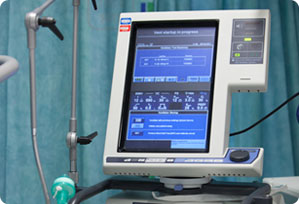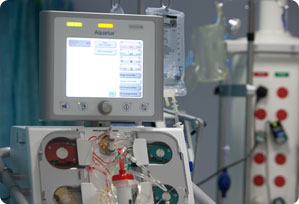Providing funds for training, equipment and research

Ultrasound Machine - £50,000
The Trust purchased this ultrasound machine in 2005 for £50,000 primarily to allow the consultants to perform their own heart scans on critically ill patients. This machine allows the structure and function of the heart to be easily assessed and helps guide the treatment of patients. Since its purchase many patients have benefitted from the information it provides and countless lives have been saved. The units lead consultant Rob Orme says "The machine is a huge asset to the department. In fact, we have collected information that shows that over 50% of patients have a change in their treatment made as a result of such heart scans. As a result of having published our experiences in a leading UK journal the Intensive Care Unit is now known across the country because of our use of ultrasound".

Ventilator - £17,000
This ventilator, often called a life support machine, was purchased by the Trust to provide the mechanism of breathing for a patient who is physically unable to breathe, or is breathing insufficiently. This was purchased in 2007 and is another vital piece of equipment that the Trust has managed to supply thanks to kind donations.

Dialysis Machine - £8,000
This dialysis machine was purchased for £8,000 and provides an artificial kidney for critically ill patients whose kidneys have failed. The machine provides temporary support whilst the kidneys recover, and is one of 3 owned by the Intensive Care Unit.
The Trust has also been able to support research projects by making funds available to cover some of the costs. In 2007 the Trust was able to support a project investigating whether an "electronic nose" was able to identify bacteria in the sputum of critically ill patients on a breathing machine. The findings were published in a journal in 2010. The electronic nose was able to detect the presence of bacteria with a reasonable degree of accuracy, thus opening up the possibility of detecting the presence of pneumonia earlier than conventional tests that rely on being able to grow the bacteria in a laboratory. Although this is still experimental it is hoped this exciting research can continue and lead to real benefits to patients in the future.
Download BJA Critical care AuditPDF Format - 94KB
Impact of echocardiography on patient management in the intensive care unit: an audit of district general hospital practice
Download EJCI documentPDF Format - 197KB
Electronic nose analysis of bronchoalveolar lavage fluid







